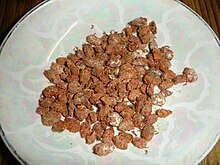尤納尼醫學
外觀
(重新導向自尤那尼医学)
| 替代醫學和偽醫學 |
|---|
 |

尤納尼醫學(烏爾都語:طب یونانی,拉丁轉寫:tibb yūnānī[1];亦作尤那尼醫學)是一種在莫臥兒帝國、南亞穆斯林地區以及中亞廣泛使用的波斯-阿拉伯傳統醫學。尤納尼一詞意為「希臘的」[2][3],因為波斯-阿拉伯醫學系統建立在公元前 460年古希臘醫生希波克拉底和蓋倫的理論上[4][5]。尤納尼醫學與阿育吠陀醫學、悉達醫學等共同構成了印度傳統醫學體系。[6]
尤納尼醫學的希臘之源可以從它建立在四大體液體系上可以看出:痰(Balgham)、血(Dam)、黃膽汁(Ṣafrā')和黑膽汁(Saudā'),不過它也受到了印度傳統醫學和中國傳統醫學的影響[7]。
參考文獻
[編輯]- ^ the transcription as Unani is found in 19th-century English language sources: "the Ayurvedic and Unani systems of medicine" "Madhya Pradesh District Gazetteers: Hoshangabad", Gazetteer of India 17 (1827), p. 587 (頁面存檔備份,存於互聯網檔案館).
- ^ William Dalrymple. City of Djinns: A Year in Delhi. Flamingo. 1994: 269. ISBN 978-0-00-637595-1.
- ^ Unani Tibb. Science Museum, London. [7 October 2017]. (原始內容存檔於2018-02-11).
- ^ Unani Medicine in India: Its Origin and Fundamental Concepts by Hakim Syed Zillur Rahman, History of Science, Philosophy and Culture in Indian Civilization, Vol. IV Part 2 (Medicine and Life Sciences in India), Ed. B. V. Subbarayappa, Centre for Studies in Civilizations, Project of History of Indian Science, Philosophy and Culture, New Delhi, 2001, pp. 298-325
- ^ Unani | Directorate of AYUSH. ayush.delhi.gov.in. [2023-11-10]. (原始內容存檔於2023-12-15).
- ^ 陳明. “十月成胎”与“七日一变”——印度胎相学说的分类及其对我国的影响. 國學研究. 2004, 13: 167-216 [2019-08-31]. (原始內容存檔於2022-03-28).
- ^ The use of Chinese herbal drugs in Islamic medicine. Journal of Integrative Medicine. [2018-01-01]. doi:10.1016/S2095-4964(15)60205-9. (原始內容存檔於2015-09-25).
